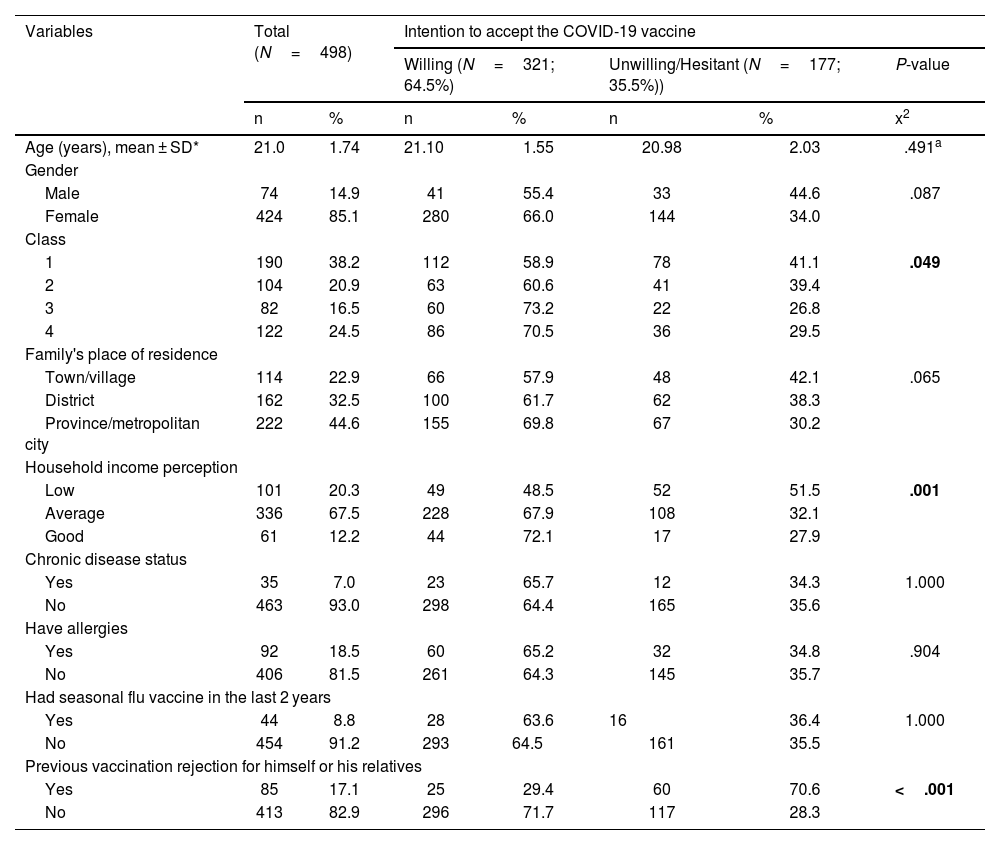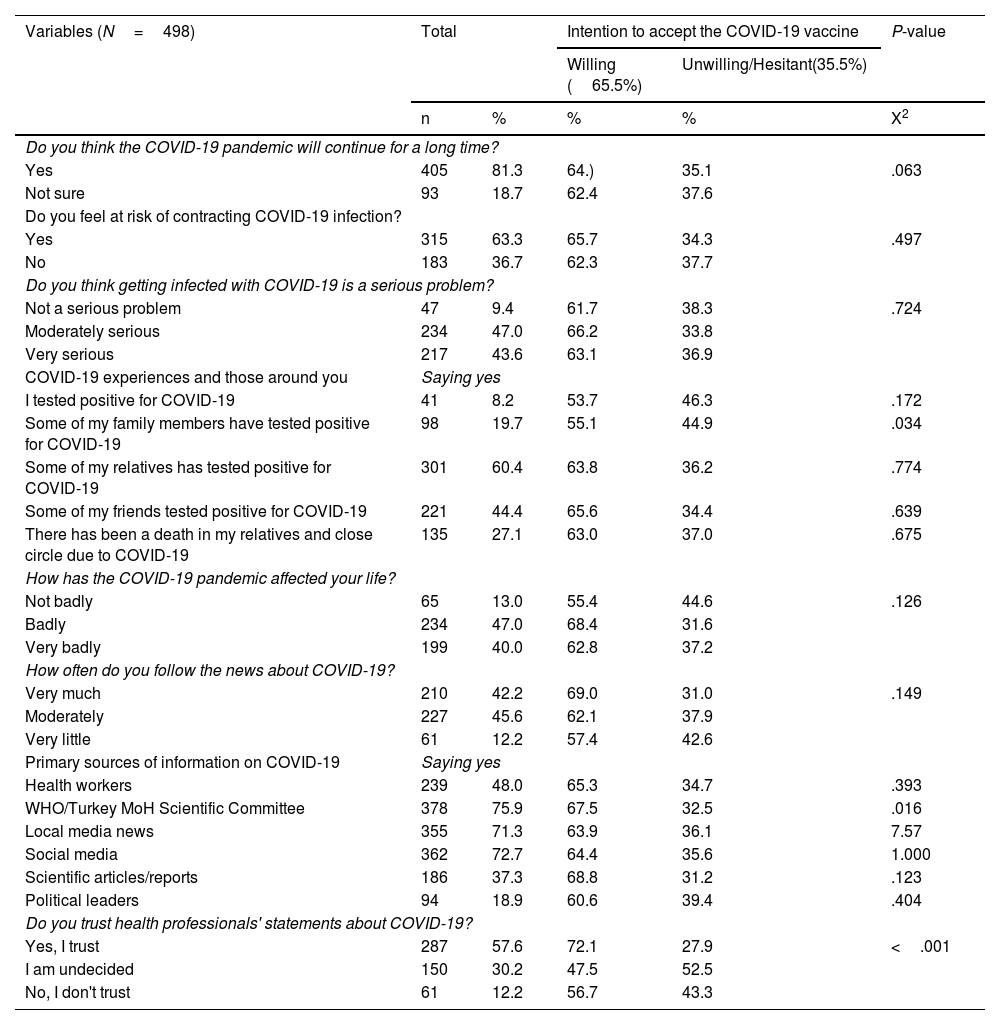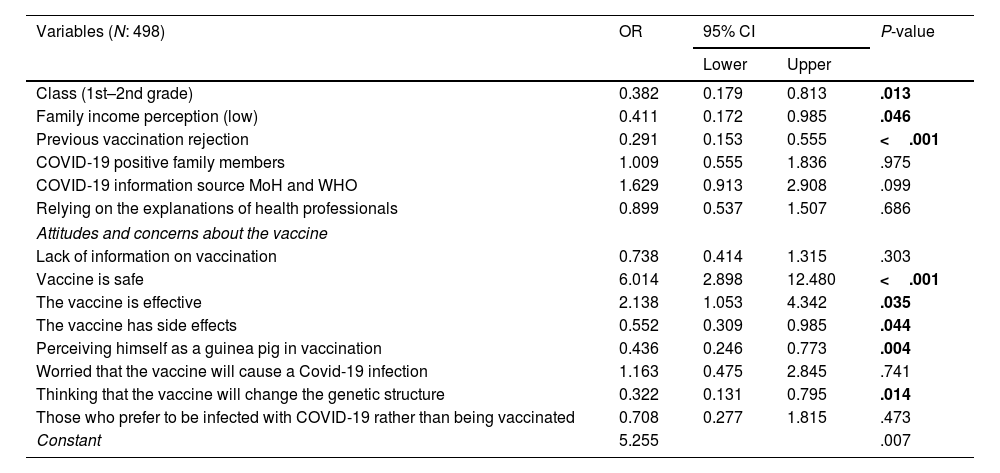This study aimed to determine the attitudes and concerns of nursing students toward the coronavirus disease-2019 (COVID-19) vaccine, their willingness to be vaccinated, and the factors affecting their willingness in the second wave of the COVID-19 pandemic.
MethodThis cross-sectional study was conducted using an online questionnaire in 498 nursing students in Izmir. Chi-square test, Student’s t-test and binary logistic regression were used in data analysis.
ResultsDespite the fact that 64.5% of nursing students intended to be vaccinated against COVID-19, they expressed their attitudes and concerns about the lack of COVID-19 vaccination information (65.7%), its effectiveness (41.6%), and safety (45.8%). Students did not intend to be vaccinated due to insufficient trust in the vaccine effectiveness (84%), the continuous COVID-19 mutation. Strong predictors of nursing students' intention to be vaccinated in the logistic regression analysis; education level, family income perception, history of vaccination rejection in the past, confidence in the vaccine, the effectiveness of the vaccine, the side effects of the vaccine, seeing oneself as a guinea pig, and thinking that the vaccine will change the genetic structure were determined (p<0.05).
ConclusionNursing students are known to be future healthcare professionals and play a decisive role in counseling individuals in the community on the risks of COVID-19 and the benefits of the vaccine. Therefore, focusing on training that is aimed at increasing vaccine knowledge, eliminating their negative attitudes and concerns, and building confidence in vaccines is necessary.
Este estudio tuvo como objetivo determinar las actitudes y preocupaciones de los estudiantes de enfermería hacia la vacuna contra la enfermedad por coronavirus-2019 (COVID-19), su disposición a vacunarse y los factores que afectan su disposición en la segunda ola de la pandemia de COVID-19.
MétodosEste estudio transversal se realizó utilizando un cuestionario en línea en 498 estudiantes de enfermería en Izmir. En el análisis de datos se utilizaron la prueba de chi-cuadrado, la prueba t de Student y la regresión logística binaria.
ResultadosMientras que el 64.5% de los estudiantes de enfermería tienen la intención de vacunarse contra el COVID-19. Los estudiantes expresan sus actitudes y preocupaciones sobre la falta de información sobre la vacuna COVID-19 (65.7%), water efectividad (41.6%) y seguridad (45.8%). Los estudiantes no tienen la intención de vacunarse debido a la falta de confianza en la eficacia de la vacuna (84%), la mutación continua de COVID-19. Fuertes predictores de la intención de los estudiantes de enfermería de ser vacunados en el análisis de regresión logística; nivel educativo, percepción de los ingresos familiares, antecedentes de rechazo a la vacunación en el pasado, confianza en la vacuna, eficacia de la vacuna, efectos secundarios de la vacuna, verse a sí mismo como como como comodia un conej la estructura genética se determinarone (p<0.05).
ConclusiónSe sabe que los estudiantes de enfermería son futuros profesionales de la salud y juegan un papel decisivo en la orientación de las personas de la comunidad sobre los riesgos de COVID-19 y los beneficios de la vacuna. Por lo tanto, es necesario utilizar la capacitación que tiene como objetivo aumentar el conocimiento sobre las vacunas, eliminar sus actitudes negativas y sospechas, y generar confianza en las vacunas.










